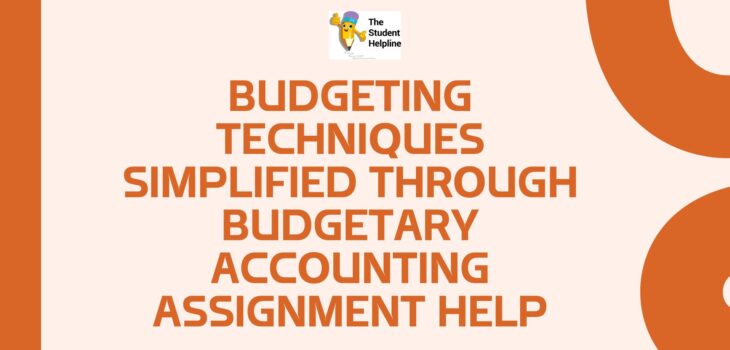 Education
Education
Budgeting Techniques Simplified Through Budgetary Accounting Assignment Help
Budgeting plays a foundational role in managing the financial health of any organization. For accounting and finance students, understanding how budgets are created, implemented, and monitored is a key learning outcome. Budgetary accounting, in particular, focuses on how organizations—especially public and non-profit sectors—plan and track spending based on established budgets.
While this subject seems straightforward, many students struggle with applying budgeting principles to complex accounting scenarios. That’s why many learners turn to accounting assignment help to break down these budgeting techniques into manageable, practical concepts.
With the support of online accounting assignment help, students can gain real clarity about preparing, analyzing, and adjusting budgets in line with financial realities. This support doesn’t just enhance academic performance—it equips students with skills they’ll need in real-world financial planning and control roles.
Understanding the Role of Budgetary Accounting in Academics
Budgetary accounting refers to the system of accounting that tracks revenues and expenditures against budgeted figures. It is commonly used in public sector organizations where accountability and adherence to budgets are essential.
Students learning this subject often encounter tasks that involve:
-
Preparing budget statements
-
Tracking budget vs. actual performance
-
Making adjustments based on financial activity
-
Understanding government or institutional budget rules
Through accounting assignment help, students receive structured explanations and examples that make even complex budget-related assignments understandable.
Why Students Struggle with Budgeting Assignments
Budgeting requires more than just number-crunching—it demands interpretation of financial data, understanding of policies, and strategic thinking. Common struggles include:
-
Confusion between different types of budgets (fixed, flexible, zero-based)
-
Difficulty interpreting variances
-
Lack of clarity in reporting standards used in public sector accounting
-
Understanding how to allocate funds across different departments or programs
Students looking for help with accounting assignment topics related to budgetary systems often feel overwhelmed by these intricacies. With expert guidance, however, they can move from confusion to clarity.
How Accounting Assignment Help Simplifies Budgeting Concepts
Through personalized guidance, an accounting assignment helper can walk a student through each stage of the budgeting process. This includes:
-
Budget Formulation: Explaining how budgets are created based on past data, future expectations, and organizational goals.
-
Monitoring and Tracking: Showing how to keep a record of expenditures and compare them with the approved budget.
-
Variance Analysis: Teaching students how to calculate and interpret the differences between budgeted and actual outcomes.
-
Corrective Measures: Discussing how organizations respond when spending exceeds or falls short of the budget.
This structured approach makes complex content more digestible and helps students apply what they’ve learned in both assignments and future roles.
Practical Budgeting Techniques Covered in Assignments
Students who access online accounting assignment help often work on assignments involving practical budgeting tools and techniques. These include:
-
Incremental Budgeting: Building the current year’s budget based on the previous year’s figures, adjusted for expected changes.
-
Zero-Based Budgeting: Justifying every expense from scratch, with no assumptions based on past data.
-
Flexible Budgeting: Adjusting budgets based on changes in activity levels or unforeseen events.
-
Performance-Based Budgeting: Linking spending to performance indicators and program outcomes.
Understanding these techniques is crucial not only for exams but also for professional competence in budgeting roles.
The Value of Online Assignment Support in Time Management
Students juggling multiple subjects often find it difficult to allocate sufficient time to complex assignments. With accounting assignment help online, they can save hours of research and focus on learning instead of stressing over formatting or formulas.
This time-saving support is particularly useful when dealing with lengthy assignments that involve creating spreadsheets, analyzing data, and writing reports. Whether it’s a budget for a local government agency or a forecast for a university department, students benefit from organized help that keeps them on track.
Developing Real-World Financial Planning Skills
Assignments supported by online accounting assignment help are designed to simulate real-world financial decision-making. For example, students may be given a scenario where a department is running over budget. They must then propose corrective measures and justify them with financial logic.
These assignments build essential workplace skills such as:
-
Analytical thinking
-
Budget planning
-
Cost control
-
Financial communication
This kind of learning goes beyond theory and prepares students for success in careers that involve budgeting and fiscal management.
Benefits of Using the Best Assignment Help in Australia for Budgetary Topics
Australian universities often have strict guidelines for assignment formatting, referencing, and analysis. Students seeking the best assignment help in Australia for budgeting topics gain the advantage of tailored academic support.
This includes:
-
Detailed explanations of Australian public sector budgeting frameworks
-
Guidance on meeting academic criteria for writing and analysis
-
Familiarity with accounting standards relevant to government and non-profit finance
Such targeted support helps students not only meet but exceed the expectations set by their institutions.
Key Tips for Students Using Budgetary Assignment Support
To get the most value from assignment help services, students should keep these tips in mind:
1. Clarify the Objective of the Assignment
Is the assignment about preparing a budget, analyzing it, or making decisions based on it? Identifying the goal helps focus the assistance.
2. Engage with Feedback
Whether from the tutor or returned assignments, feedback is a valuable tool for growth. Understanding mistakes and correcting them builds confidence.
3. Practice What You Learn
After receiving help, students should try solving similar problems on their own to reinforce learning.
4. Ask for Real-World Examples
Connecting textbook theories to real budgeting cases makes the learning process more meaningful.
Strengthening Confidence for Exams and Careers
Students who consistently work with an accounting assignment helper develop a strong foundation not just for exams but for real-world roles. Budgeting skills are essential in every business or public sector organization. The ability to create, manage, and analyze budgets is a powerful skill that employers look for.
By taking their assignments seriously and using support as a learning tool, students gain confidence in:
-
Making financial forecasts
-
Adjusting to fiscal constraints
-
Reporting budget performance clearly
-
Aligning budgets with organizational strategy
Conclusion: Smarter Budgeting Begins with Smarter Learning
Budgetary accounting is not just an academic requirement—it’s a skill that shapes financial decision-making in organizations of all sizes. With proper guidance through accounting assignment help, students can transform their approach to budgeting from confusion to clarity.
Online accounting assignment help is more than just a solution provider—it’s a learning partner that supports students in developing analytical thinking, time management, and financial communication. When used effectively, this support helps students not only excel in class but prepare for the financial responsibilities they’ll encounter in their careers.
For students looking to succeed in budgeting assignments and beyond, the best assignment help in Australia provides the tools and insights needed to master budgetary accounting with confidence.








